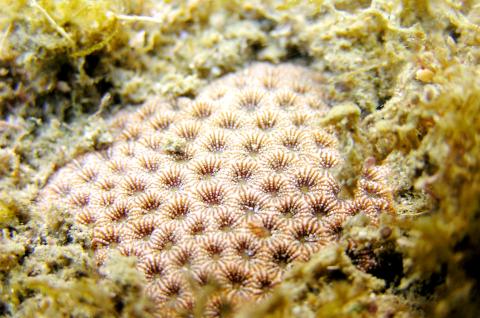Two new species of shallow-water coral have been discovered just off the coast of Taiwan, but their natural habitat is being threatened by construction projects in the area, environmentalists said yesterday, urging the government to put greater emphasis on ocean conservation.
Chen Chao-lun (陳昭倫), an associate researcher with the Biodiversity Research Center at Academia Sinica, yesterday told a press conference that after more than 20 years of research on corals in Taiwan, Academia Sinica’s research lab has confirmed the recent discovery of two new endemic species of coral — Pseudosiderastrea formosa and Polycyanthus chiashanensis.
The discoveries were made during a cross-national collaboration research project involving researchers from Taiwan, Japan, Australia, Kenya and Brazil. News of the discoveries was published in the academic journal Zoological Studies in January and last month.

Photo: Liu Chiu-jen, Taipei Times
Chen said the significance of the discoveries is that from the perspective of biogeography, Taiwan is located on the northern rim of the Pacific Ocean’s coral triangle. Despite this, nearly 300 species of coral have been found in the area, so the two new species underlines that there is great biodiversity in waters near Taiwan.
From the perspective of species evolution, Pseudosiderastrea formosa is only the second species of Pseudosiderastrea coral identified and 77 years had passed since the first species, Pseudosiderastrea tayamai, was found in 1935 in waters between Australia and Papua New Guinea, he added.
From the perspective of marine species conservation and environmental protection, Chen said: “The two species of coral have not been described in other parts of the world.”
“Both of them are small in size and inhabit shallow waters that are less than 10m deep, mostly water only about 1m to 3m deep, but because their habitat is very close to areas where there are human activity, they are very easily affected by human behaviors,” he said.
The Polycyanthus chiashanensis was first found in shallow waters near Greater Kaohsiung’s Takao Hill (also named Chiashan, 柴山) in 2010, at just about the same time the local government had began drilling the reef coast at Siz-ihwan (西子灣) to erect border dikes in a sea reclamation construction project, said Lan Pei-rong (藍培榮), a former chairperson of the Takao Hill Association.
“There are also many illegal constructions near the western coast of Takao Hill and these commercial activities will affect the habitat of the corals,” he said.
The association urged the government to apply to the International Union for Conservation of Nature and Natural Resources to list the two new species of coral as endangered. This would allow them to receive better protection.
Meanwhile, the Taiwan Environmental Information Center said it is particularly concerned about construction plans in the coastal regions of Taitung County, the location of some of the nation’s major coral reefs.
The Environmental Impact Assessment review should add the underwater ecological environment to its list of evaluation items, the center suggested.

‘DENIAL DEFENSE’: The US would increase its military presence with uncrewed ships, and submarines, while boosting defense in the Indo-Pacific, a Pete Hegseth memo said The US is reorienting its military strategy to focus primarily on deterring a potential Chinese invasion of Taiwan, a memo signed by US Secretary of Defense Pete Hegseth showed. The memo also called on Taiwan to increase its defense spending. The document, known as the “Interim National Defense Strategic Guidance,” was distributed this month and detailed the national defense plans of US President Donald Trump’s administration, an article in the Washington Post said on Saturday. It outlines how the US can prepare for a potential war with China and defend itself from threats in the “near abroad,” including Greenland and the Panama

A wild live dugong was found in Taiwan for the first time in 88 years, after it was accidentally caught by a fisher’s net on Tuesday in Yilan County’s Fenniaolin (粉鳥林). This is the first sighting of the species in Taiwan since 1937, having already been considered “extinct” in the country and considered as “vulnerable” by the International Union for Conservation of Nature. A fisher surnamed Chen (陳) went to Fenniaolin to collect the fish in his netting, but instead caught a 3m long, 500kg dugong. The fisher released the animal back into the wild, not realizing it was an endangered species at

The Chinese Nationalist Party (KMT) is maintaining close ties with Beijing, the Democratic Progressive Party (DPP) said yesterday, hours after a new round of Chinese military drills in the Taiwan Strait began. Political parties in a democracy have a responsibility to be loyal to the nation and defend its sovereignty, DPP spokesman Justin Wu (吳崢) told a news conference in Taipei. His comments came hours after Beijing announced via Chinese state media that the Chinese People’s Liberation Army’s Eastern Theater Command was holding large-scale drills simulating a multi-pronged attack on Taiwan. Contrary to the KMT’s claims that it is staunchly anti-communist, KMT Deputy

The High Prosecutors’ Office yesterday withdrew an appeal against the acquittal of a former bank manager 22 years after his death, marking Taiwan’s first instance of prosecutors rendering posthumous justice to a wrongfully convicted defendant. Chu Ching-en (諸慶恩) — formerly a manager at the Taipei branch of BNP Paribas — was in 1999 accused by Weng Mao-chung (翁茂鍾), then-president of Chia Her Industrial Co, of forging a request for a fixed deposit of US$10 million by I-Hwa Industrial Co, a subsidiary of Chia Her, which was used as collateral. Chu was ruled not guilty in the first trial, but was found guilty